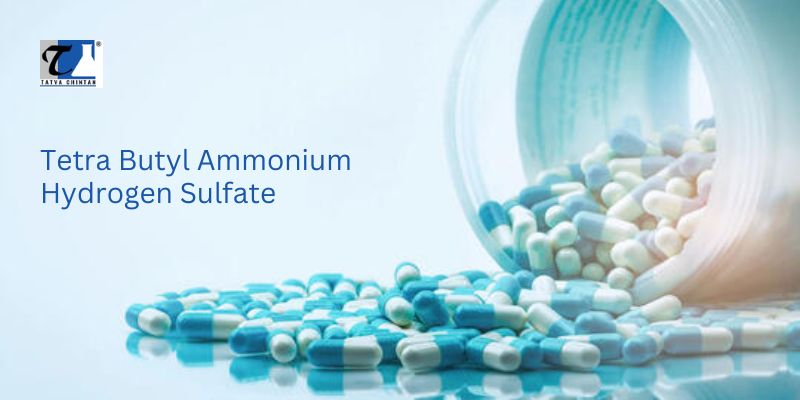Exploring Phase Transfer Catalysts: Tetra Butyl Ammonium Hydrogen Sulfate in Pharmaceutical and Polymer Industries
Phase transfer catalysts (PTC), like Tetra Butyl Ammonium Hydrogen Sulfate (TBAHS), are crucial chemicals in the pharmaceutical and polymer industries. These catalysts boost reaction efficiency and solvent compatibility in chemical reactions. Widely used in organic synthesis, PTC enhances catalyst performance, streamlining drug discovery and polymer production.
Understanding Phase Transfer Catalysis
Phase transfer catalysis is an effective way to undergo chemical transformations in systems containing two or more phases and reagents. This approach is particularly important in a situation where reactants have poor compatibility. A phase-transfer catalyst facilitates these reactions by enabling interactions between organic compounds (soluble in organic solvents) and inorganic salts (soluble in water).
The process usually happens in a biphasic system where nonpolar aprotic solvents other than DMSO or DMF and water are used as solvents. This phase-transfer catalyst dissolves in both solvents. Using this method, the reactions are performed at mild conditions and the products are easily separated from the unreacted starting materials and catalysts. This makes phase transfer catalysis suitable for manufacturing processes.
Some PTCs are quaternary ammonium salts like Tetra Butyl Ammonium Hydrogen Sulfate, crown ethers, and phosphonium compounds. They are popular in the pharmaceutical and polymer industries because of their application in organic synthesis, reaction enhancement, and support of green chemistry.
Using Tetra Butyl Ammonium Hydrogen Sulfate in Pharmaceutical and Polymer Industries
PTCs enhance the efficiency of reactions that may otherwise be slow due to the immiscibility of the reactants. As one of the chemical compounds manufactured by Tatva Chintan, TBAHS is seen as one of the most effective PTCs. TBAHS, which is an ammonium salt, is used as a cocatalyst in the reaction mixture for the preparative synthesis of alternating polyketones and propionic acid.
Here are the benefits of TBAHS in the pharmaceutical and polymer industry.
1. Catalysis and Organic Synthesis
TBAHS plays a significant role in the pharmaceutical and polymer industries. It improves the rate of reactions and acts as a co-catalyst for the completion of chemical reactions and compatibility in solvents.
Some of the uses include the synthesis of drugs, polymerization, and other industrial processes; therefore, it well demonstrates its importance in the area of green chemistry and general catalytic functions.
2. Reaction efficiency
One of the primary benefits of using TBAHS manufactured by Tatva Chintan is its ability to increase reaction efficiency. Control over the phase of reactants minimizes time and energy. This makes processes more efficient and cost-effective.
Additionally, using TBAHS, manufacturers in the pharmaceutical and polymer industries can not only reduce costs but also increase productivity. As a result, TBAHS is an important part of both the pharmaceutical and polymer industries due to its efficiency.
3. Drug synthesis
In the pharmaceutical industry, TBAHS is involved in the synthesis of drugs. This makes it possible to catalyze the formation of highly structured organic compounds that are essential in the development of new drugs.
Furthermore, the properties of TBAHS such as high selectivity and efficiency make it relevant in green chemistry. This is because it helps to increase the rate and yield of reactions, and therefore come up with effective and new pharmaceutical products.
4. Manufacturing processes
TBAHS can be used to increase the productivity and effectiveness of processes involved in making products. This, in turn, results in minimized risks and enhanced practices in the production of pharmaceutical products.
Aside from enhancing reaction rates and the general conditions of the reactions, it also improves productivity and compliance with green chemistry standards. Therefore, the use of TBAHS produced by Tatva Chintan becomes crucial in cutting down the use of environmentally unfriendly practices in the chemical industry.
5. Polymerization
TBAHS is commonly used as a catalyst in polymerization reactions because it aids in the creation of polymers by enabling the transition of monomers across phases. They make the polymerization process more efficient, thus delivering polymers with better properties and significantly higher molecular weights.
The improved selectivity makes it possible to have better control over the structure and properties of the polymers; thus, TBAHS can be employed as an effective tool in synthesizing polymers for different applications.
6. Catalyst performance
As an effective catalyst in polymerization, TBAHS has been observed to have significant performance. TBAHS provides better control of the structure as well as the composition of the polymer, thus yielding high-purity polymers.
This enhancement in control propels the synthesis of polymers with the appropriate properties for desired end products. Therefore, TBAHS is a useful tool in the synthesis of polymers and several industries.
7. Green chemistry
The emergence of green chemistry practices in the industry is crucial to the advancement of TBAHS, which plays a significant role in supporting the principles of green chemistry. As a result of its commitment to reducing waste and reducing the use of toxic solvents, TBAHS contributes to a more sustainable process in the polymer industry.
Moreover, its excellent compatibility with a variety of reaction mediums further enhances its suitability for eco-friendly applications. In other words, TBAHS produced by Tatva Chintan is a preferred choice for manufacturing practices that are aware of the environment and are advancing the eco-friendly approach to manufacturing.






Comments
Post a Comment